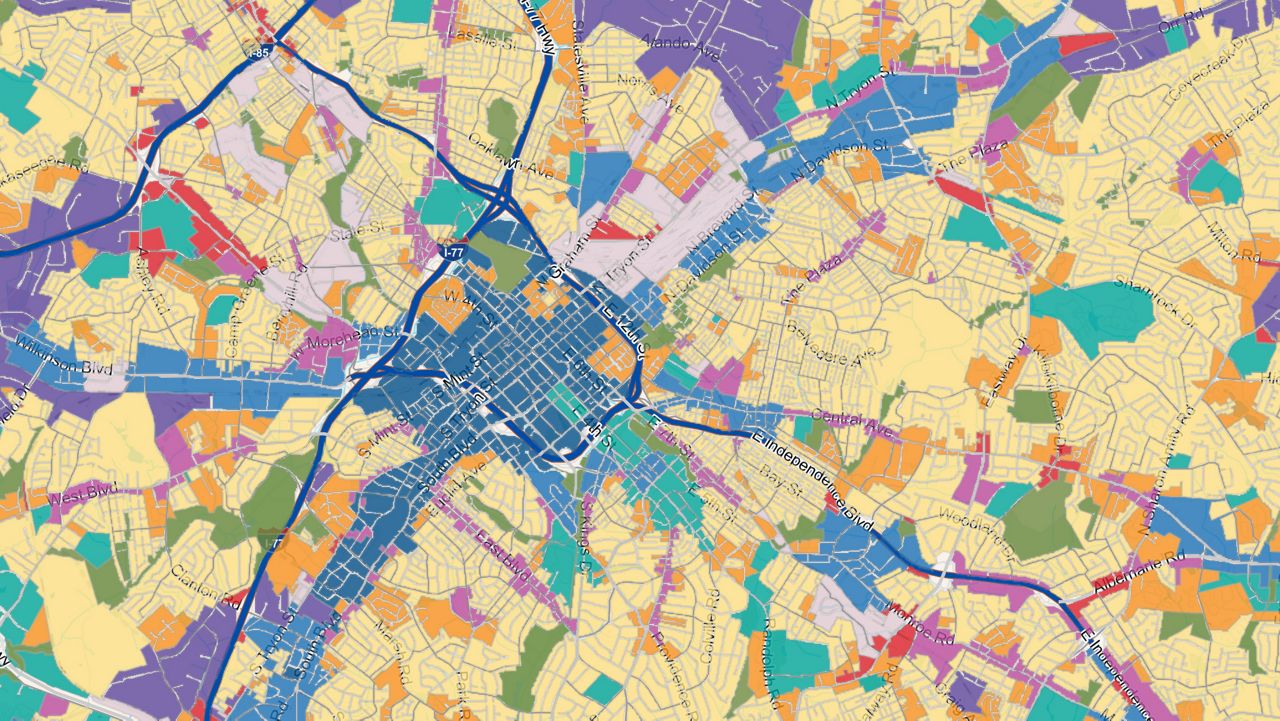The Impact of State Zoning Law on Affordable Housing
Photo Credit: City of Charlotte
Milo Graber
Student Intern
Mecklenburg County Community Support Services
Particularly in rapidly growing municipalities like Charlotte-Mecklenburg, zoning laws have become a critical tool and sometimes a barrier in the effort to address housing affordability.
This blog post synthesizes research about zoning laws in North Carolina and examines what zoning is and how it can affect housing affordability.
WHAT IS ZONING?
According to the City of Charlotte, zoning is a designation used to describe the way private land may be used in a given area. Zoning categories include residential areas for homes, commercial areas for business, and agricultural areas for farm uses. Each of these categories has its own set of rules about what types of buildings and activities are permitted within the area. Depending on the type of zone classification, there may be different limitations on building density, lot size, building height, and type of construction. The goal of zoning is to promote growth and prevent conflicts over land use. For example, no homeowner wants a noisy factory built next door to their house.
Advocates may describe zoning rules as being exclusionary, inclusionary, or conditional. According to UNC School of Government, with inclusionary zoning, a city will use its zoning power to require developers to build affordable housing units whenever they build a new development. The city also may include incentives for including extra affordable units. According to the Carolina Planning Journal, exclusionary zoning increases housing costs because of its tendency to restrict supply through requirements that limit density, such as large minimum lot sizes or only allowing single family units in a residential zone. Conditional zoning allows for the city to make decisions regarding residential development on a case-by-case basis. This process might lead to more affordable housing projects, such as when cities ask for such concessions from developers in exchange for allowing other things a developer wants from the city, but it can also lead to slow approval processes.
HOW DOES ZONING IMPACT AFFORDABILITY?
Zoning policies impact the cost of housing due to their effect on housing supply. When a city limits the number of units in an area or limits development to single-family homes, as opposed to duplexes or triplexes, the total supply of new units is decreased. Zoning rules that require all units to get allocated parking spots limit density because land that could be used for additional units is taken up by parking. These types of rules may encourage urban sprawl, which is a term that describes low-density development that leads a city to grow consistently outward leading to an increase in total area and higher infrastructure costs for the municipality. Zoning rules that are exclusionary may also limit the supply of affordable housing by banning multifamily units. Inclusionary zoning rules can use incentives to encourage or require developers to include a percentage of affordable units within new housing projects.
WHAT ZONING POLICIES MIGHT INCREASE HOUSING AFFORDABILITY?
In recent years, the State of North Carolina has loosened some building rules, which could reduce the cost of housing. According to the UNC School of Government, in 2023, the General Assembly forbade local governments from imposing restrictions on building-design elements on residential structures with up to four units. This increases the cost-effectiveness of building triplexes and quadplexes, potentially increasing their supply. The same year, the General Assembly precluded cities from requiring parking spaces larger than 9×20 feet, except for accessible, parallel, or diagonal parking. This rule allows for more housing units to be developed on the same amount of land, increasing housing density, because less space needs to be dedicated to parking.
North Carolina’s municipal governments are experimenting with policies to increase housing density. In 2023, the City of Charlotte enacted a new Unified Development Ordinance (UDO), which permits more density by allowing duplexes, triplexes, and quadplexes. Previously, the zoning code only allowed single-family homes. The UDO also permits homeowners to build Accessory Dwelling Units (ADUs) in all residential zones without needing discretionary approval for doing so. Raleigh, Asheville, and Durham, among others, have also adopted similar policies.
Inclusionary zoning is a legal grey area in North Carolina. North Carolina is not a home rule state, which means that local governments can only enact the types of rules explicitly authorized by the General Assembly, rather than being more autonomous. Davidson, Manteo, and Chapel Hill have enacted inclusionary zoning rules, claiming they have the authority to regulate the location and use of buildings. Other localities have concluded that the most they can do is to offer incentives to developers to build affordable units voluntarily. For example, in Chapel Hill, the city requires that new developments of five or more homes must include 15% affordable for-sale units (10% in the town center).
SO WHY DOES THIS MATTER?
Zoning rules matter because they have tremendous power to influence the supply and affordability of housing. Through these rules, cities are capable of determining whether or not people are able to live in their community. Historically, zoning policies have been used as tools to exclude people by class and race with profound impacts on the people’s housing options. Adopting zoning policies that allow for higher-density, lower-cost development can help Charlotte-Mecklenburg increase affordable housing stock and create more inclusive, affordable housing opportunities for all residents.
For more information on zoning practices and laws in NC, click here: Zoning Resources


